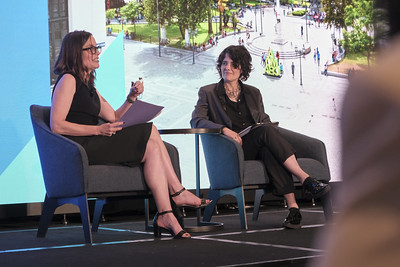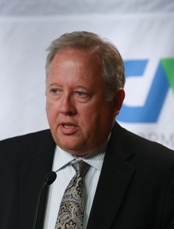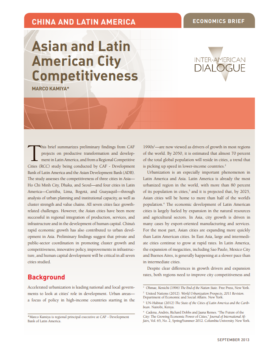A Conversation with Luis Castañeda Lossio, Mayor of Lima
Lima is a problematic city, but it has its charm. Its charm is in being problematic.
The 26th Annual CAF Conference, organized by the Inter-American Dialogue, CAF-Development Bank of Latin America and the Caribbean, and the Organization of American States on June 1-2, 2023, kicked off with a fireside chat between Dr. Rebecca Bill Chavez, president and CEO of the Inter-American Dialogue and Ambassador Nina Hachigian, US Special Representative for City and State Diplomacy, to discuss the inaugural Cities Summit of the Americas, which was held in Denver, Colorado, in April. The summit, organized by the US State Department in partnership with Denver’s local government and a non-governmental organization called the Biennial of the Americas, gathered some 2,500 participants, including 250 mayors, city officials, representatives of global networks that cities are a part of, Indigenous leaders, civil society, and the private sector. The idea behind the forum, Hachigian said, was to take the high-level commitments made by leaders at the 2022 Summit of the Americas on issues ranging from climate, the digital transformation, and migration, and bringing them down to where the action really happens – at the local level – in a bid to imagine local solutions to global challenges.
The State Department had different goals in mind for the Cities Summit, Hachigian added, but it mostly centered on the implementation of the high-level commitments made at the Summit of the Americas. Among the key successes, she said, was that the forum allowed for the sharing of best practices – not only among mayors but also with existing cities networks and other stakeholders – on issues like climate, migration, and countering extremist violence, which had never been convened in the same place at the same time. Despite thinking about similar challenges and solutions, many of these actors are not often connected through action, and the Cities Summit provided the opportunity for such relationships to develop.
Chavez and Hachigian highlighted the role that cities play in imagining solutions to issues that can be harder to tackle at the international and national levels, including migration. Hachigian emphasized how local governments have significant power to influence how migrants are integrated into and perceived by the community. The government of Bogotá, for instance, has launched migrant centers that function as a sort of one-stop shop for refugees’ legal and employment needs and can serve as an example for other host cities. Even in the United States, Hachigian added, many mayors see migrants as a way to grow the population and boost the local economy, and they have taken the initiative to change negative national narratives surrounding the topic. Another such issue is women’s economic empowerment. In this regard, Hachigian sees an opportunity for cities to take on a bigger and better role in “taking care of caregivers,” so that caregivers have the ability to educate themselves or find employment. During the Cities Summit, US Secretary of State Antony Blinken held a roundtable with five women mayors on the challenges they have faced as the first female leaders in all but one of the cities and about the ways in which they are advancing women’s empowerment.
Looking ahead, Hachigian’s goal is that 2023’s Cities Summit is not the only one. She expressed hope that the declarations signed at summit, including on anti-racism, sustainability and climate, and the use of data in governance, will be taken forward and, most importantly, that the connections made at the forum will continue to grow.
Lima is a problematic city, but it has its charm. Its charm is in being problematic.
The Inter-American Democratic Charter is a watershed in how the region understands democracy.
Despite clear differences in growth drivers and expansion rates, both regions need to improve city competitiveness and sustainability.
 Jack Schwartz
Jack Schwartz

